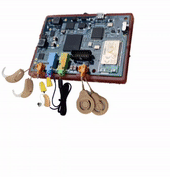
Experimental hardware-research interfaces form a crucial role during developmental stages of any medical, signal-monitoring system as it allows researchers to test and optimize output results before perfecting the design for the actual FDA approved medical device and large-scale production. These testing platforms, intake raw signals through which performance of novel algorithms can be analyzed and modified to generate the desired data points for an optimized output, allowing the advancement of the medical device. With cochlear implants (CIs) and hearing aids (HAs) becoming a more common solution for varying degrees of hearing impairment, having modern signal processing strategies tested for such speech sensitive systems is a necessity. But the rigid design requirements of commercial CI and HA processors make it difficult to explore novel algorithms for research investigations and conducting longitudinal studies. This study presents the design, development, clinical evaluation, and applications of CCi-MOBILE, a computationally powerful signal processing testing platform built for researchers in the hearing-impaired field. The custom-made, portable research platform allows researchers to design and perform complex speech processing algorithm assessment offline and in real-time. It can be operated through user-friendly, open-source software and is compatible with implants manufactured by Cochlear Corporation. The FPGA design and hardware processing pipeline for CI stimulation is discussed followed by results from an acute study with implant users’ speech intelligibility in quiet and noisy conditions. The results show a consistent level of performance compared with CI users’ clinical processor, thus confirming the viability of the platform in chronic CI based studies.

